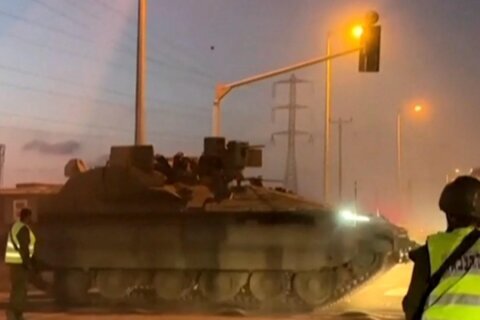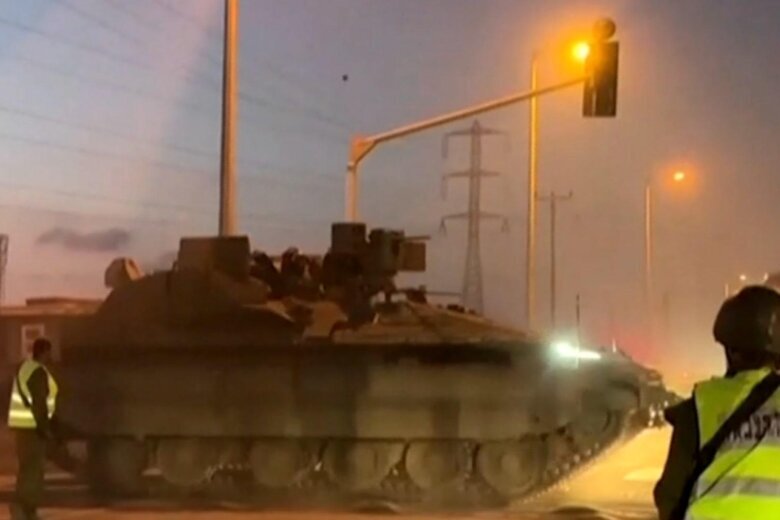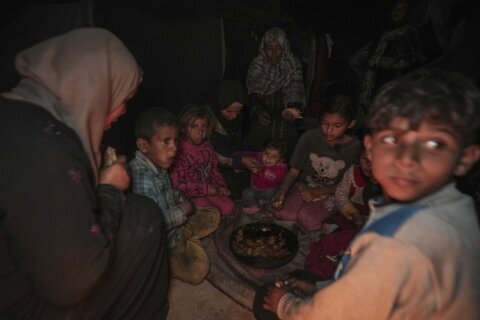
While there is no reported credible threat, CBS News has reviewed multiple internal law enforcement bulletins and security assessments circulated in the last 48 hours that warn that homegrown and domestic violent extremists are likely to mobilize in response to the Israel-Hamas conflict.
Noting Hamas’ latest call to action, which mentioned “the Friday of al-Aqsa flood,” an NYPD intelligence analyst warned, “The group has called for a ‘day of rage’ on numerous occasions in the past, which have catalyzed large demonstrations and unrest in the West Bank, Gaza, and Jerusalem. Nevertheless, these latest statements have the potential to resonate and spark reactionary unrest and exploitative violence beyond the region, warranting elevated vigilance on the part of law enforcement personnel.”
The assessments include private intelligence analysis, including recent work by the group Insikt, which describes itself as a team of veteran threat researchers. “Violent extremists in North America, Europe, and Australia are likely to plan physical attacks and increase virtual harassment campaigns against Jewish and Muslim communities — as well as entities perceived to be related to them — in the wake of Hamas’ October 7, 2023, hybrid attack and incursion into Israel and Israel ‘s military response,” the report said.
The group said it’s unaware of specific or credible terror threats right now, “but actors associated with violent extremist movements outside the conflict zone have called for broader mobilizations since the beginning of the incursion.”
Insikt says that historically, escalations in the conflict between Israelis and Palestinians have triggered violence against Western Jewish communities, targeting “houses of worship, community centers, government facilities, and public demonstrations.”
Internally, law enforcement has been sending around earlier guidance from the National Counterterrorism Center (NCTC) on how to mitigate risk and threats to places of worship and re-emphasizing the importance of consistent outreach to faith groups.
In a briefing led by the Department of Homeland Security, officials described the current threat landscape as “volatile” and “unpredictable,” warning that changes in the conflict overseas “might create additional homeland security challenges” in the U.S.
“I think everybody is pretty well attuned to the different ways in which the conflict could expand — in northern France, involving Lebanese Hezbollah, other actors in the region becoming involved,” one DHS official said. “Each of those, were they to materialize, would have potential implications for our homeland security.”
DHS Secretary Alejandro Mayorkas and Attorney General Merrick Garland met Thursday with President Biden and other senior officials at the White House to discuss steps to safeguard the homeland.
DHS officials told CBS News that they’re not aware of any of the tactics, techniques, procedures used by Hamas on the ground influencing Neo-Nazi groups in the U.S. granularly. However, one official said, “It’s reasonable to assume that those who harbor that kind of a worldview and narrative will look to inspiration or example from those who carried out horrific attacks before.”
Cities across the U.S. have been bolstering security around houses of worship after the devastating attacks on Israel, amid an “incredibly dynamic” threat environment.
“In many communities, news broke early Saturday morning. Many people were in synagogue, they were at services, and they weren’t using electronics and they walked out and there were police squad cars there,” said Michael Masters, the director of the Secure Community Network. “It’s absolutely critical that we recognize how dynamic the environment is and that we stay prepared and vigilant.”
Headquartered in Chicago and created after 9/11, the Secure Community Network employs dozens, including several security analysts with military or private intelligence backgrounds. Since Saturday, the official security agency for American Jewish institutions has expanded its footprint. Staffed 24/7, analysts monitor conditions both overseas and domestically, standing ready to alert any of the thousands of synagogues, community centers or day schools in their network.
Authorities in New York City, Washington D.C. and Los Angeles have boosted security at Jewish and Muslim sites, temples and schools this week, over concern that fighting in Israel-Gaza could prompt hate crimes.
As a precaution, the NYPD ordered officers to report in full uniform Friday, a law enforcement official confirmed to CBS News. All of the department’s 77 precincts havebeefed up security with additional personnel deployed to cover anticipated protests Friday. Officials stressed they’re working to ensure any protests remain peaceful.
Last Sunday, Rabbi Sam Spector of Congregation Kol Ami in Salt Lake City interrupted the cantor to evacuate the synagogue after receiving a bomb threat. A video posted on the Facebook page of Congregation Kol shows the rabbi asking for congregants to “calmly please exit the building” and go to a nearby park.
Spector told CBS News affiliate KUTV that staff received an email saying that there was a bomb in the building and that bombs had been placed in other Jewish centers around Utah. Police searched the facilities but found no explosives.
But “bomb threats in Utah were just some of the bomb threats received that day,” according to Masters, who added that congregations in Arizona and throughout the Southwest received similar threats. Headquartered in Chicago and created after 9/11, the Secure Community Network employs dozens of staff – including several security analysts with military or private intelligence backgrounds – to help safeguard Jewish organizations, nationwide.
“We are seeing multiple bomb threats continue to be called into the Jewish community and other faith-based organizations along with swatting incidents. And we’re working with our federal, state and local law enforcement partners and others in the Jewish community to develop policies and protocols to respond to those to ensure that the community is prepared and that we can be resilient,” Masters told CBS News.
According to research from the ADL’s Center on Extremism, calls for violence against Jews, Israelis and Zionists on Telegram increased 400% in the 18 hours after the massacre by Hamas in Israel. ADL tells CBS News that the uptick in violent rhetoric has not slowed down in the days since.
“It’s coming from all angles,” said Oren Segal, vice president of the Center on Extremism at the ADL, said of online threats on social media platforms ranging from Telegram to X. “It’s the celebration of dead Jewish bodies and the justification of the brutality that we saw.”
The ADL says it has also tracked several dozen antisemitic acts ranging from harassment to assault to vandalism since the Oct. 7 massacre in Israel and is working to verify those real-life incidents.
“We know what happens online doesn’t stay online,” Segal said, noting that ADL last saw a spike in antisemitic behavior after a major outbreak in violence in the ongoing Israeli-Palestinian conflict in May 2021. “We saw a significant increase in antisemitism that month. A lot of it tied to the conflict in the Middle East. If the past is any indication, we are going to see another spike now.”
ADL’s Center for Extremism has tracked over 100 rallies around the country that “feature a type of celebration and justification for murdering Israeli children and the elderly,” according to Segal.
The Council on American-Islamic Relations (CAIR), the nation’s largest Muslim civil rights organization, says its Maryland office has received, “growing reports of Muslim and Arab students experiencing harassment and intimidation in public high schools and on college and university campuses.”








